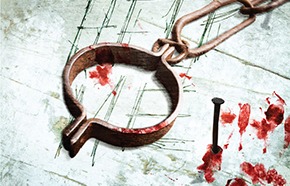Extracts
Extract: Genesis by Karin Slaughter
Genesis is the third novel in Karin Slaughter‘s Will Trent series. When Special Agent Will Trent of the Criminal Investigation Team returns to the scene of an accident, he stumbles on a torture chamber buried deep beneath the earth. This hidden house of horror reveals a ghastly truth – the accident victim is just the first target of a sick, sadistic killer.
Read an extract from the book here…
Feeling inspired? You can find out more about this book and others in our Dead Good Recommends promotion here.
Genesis by Karin Slaughter
They had been married forty years to the day and Judith still felt like she didn’t know everything about her husband. Forty years of cooking Henry’s dinner, forty years of ironing his shirts, forty years of sleeping in his bed, and he was still a mystery. Maybe that was why she kept doing all these things for him with little or no complaint. There was a lot to be said for a man who, after forty years, still managed to hold your attention.
Judith rolled down the car window, letting in some of the cool, spring air. Downtown Atlanta was only thirty minutes away, but out here in Conyers you could still find areas of undeveloped land, even some small farms. It was a quiet place, and Atlanta was just far enough away so that she could appreciate the peace. Still, Judith sighed as she caught a quick glimpse of the city’s skyscrapers on the distant horizon, thinking, home.
She was surprised at the thought, that Atlanta was now a place she considered her home. Her life until recently had been suburban, even rural. She preferred the open spaces to the concrete sidewalks of the city, even while she admitted that it was nice living in so central a location that you could walk to the corner store or a little café if the mood struck you.
Days would pass without her even having to get into a car – the type of life she would have never dreamed of ten years ago. She could tell Henry felt the same. His shoulders bunched up around his ears with tight resolve as he navigated the Buick down a narrow country road. After decades of driving just about every highway and interstate in the country, he instinctively knew all the back routes, the doglegs and shortcuts.
Judith trusted him to get them home safely. She sat back in her seat, staring out the window, blurring her eyes so that the trees bordering the road seemedmore like a thick forest. She made the trip to Conyers at least once a week, and every time she felt like she saw something new – a small house she’d never noticed, a bridge she’d bumped over many times but never paid attention to. Life was like that. You didn’t realize what was passing you by until you slowed down a little bit to get a better look.
They’d just come from an anniversary party in their honor, thrown together by their son. Well, more likely thrown together by Tom’s wife, who managed his life like an executive assistant, housekeeper, babysitter, cook and – presumably – concubine all rolled up into one. Tom had been a joyful surprise, his birth an event doctors had said would never come about. Judith had loved every part of him on first sight, accepted him as a gift that she would cherish with every bone in her body. She had done everything for him, and now that Tom was in his thirties, he still seemed to need an awful lot of taking care of. Perhaps Judith had been too conventional a wife, too subservient a mother, so that her son had grown into the sort of man who needed – expected – a wife to do everything for him.
Judith certainly had not enslaved herself to Henry. They had married in 1969, a time when women could actually have interests other than cooking the perfect pot roast and discovering the best method to get stains out of the carpet. From the start, Judith had been determined to make her life as interesting as possible. She’d been a room mother at Tom’s school. She’d volunteered at the local homeless shelter and helped start a recycling group in the neighborhood. When Tom was older, Judith took a job doing light bookkeeping for a local business and joined a running team through the church to train for marathons. This active lifestyle stood in stark contrast to that of Judith’s own mother, a woman who toward the end of her life was so ravaged from raising nine children, so drained from the constant physical demands of being a farmer’s wife, that some days she was too depressed to even speak.
Though, Judith had to admit, she had herself been a somewhat typical woman in those early years. Embarrassingly, she was one of those girls who had gone to college specifically to find a husband. She had grown up near Scranton, Pennsylvania, in a town so small it didn’t merit a dot on the map. The only men available to her were farmers, and they were hardly interested in Judith. Judith could not blame them. The mirror told no lies. She was a bit too plump, a bit too bucktoothed, and a bit too much of everything else, to be the sort of woman Scranton men took for a wife. And then there was her father, a stern disciplinarian whom no sane man would seek out for a father-in-law, at least not in exchange for a bucktoothed, pear-shaped girl who had no natural talent for farming.
The truth was that Judith had always been the odd one in the family, the one who didn’t quite fit in. She read too much. She hated farmwork. Even as a young girl, she was not drawn to animals and did not want to be responsible for their care and feeding. None of her sisters and brothers had been sent away for higher education. There were two brothers who had dropped out of ninth grade, and an older sister who had married rather quickly and given birth to her first child seven months later. Not that anyone bothered to do the math. Enveloped in a constant state of denial, her mother had remarked to her dying day that her first grandchild had always been big-boned, even as an infant. Thankfully, Judith’s father had seen the writing on the wall so far as his middle girl was concerned. There would be no marriage of convenience with any of the local boys, not least of all because none of them found her remotely convenient. Bible college, he decided, was not just Judith’s last – but her only – chance.
At the age of six, Judith had been struck in the eye by a flying piece of debris as she chased after the tractor. From that moment on, she’d always worn glasses. People assumed she was cerebral because of the glasses, when in fact the opposite was true. Yes, she loved to read, but her tastes ran more toward trashy dime novel than literary. Still, the egghead label had stuck. What was it they used to say? ‘Men don’t make passes at women who wear glasses.’ So, it was surprising – no, more like shocking – when on Judith’s first day of college in her first class, the teaching assistant had winked at her.
She had thought something was in his eye, but there was no mistaking Henry Coldfield’s intentions when, after class, he had pulled her aside and asked her if she’d like to go down to the drugstore and have a soda with him. The wink, apparently, was the beginning and end of his gregariousness. Henry was a very shy man in person; strange, considering he later became the top salesman for a liquor distribution company – a job he passionately despised even three years past retirement.
Judith supposed Henry’s ability to blend had come from being the son of an Army colonel, moving around the country so often, never staying at one base more than a few years at a time. There was no passionate love at first sight – that came later. Initially, Judith had simply been attracted to the fact that Henry was attracted to her. It was a novelty for the pear from Scranton, but Judith had always been at the opposite spectrum of Marx’s philosophy – Groucho, not Karl: She was more than willing to join any club that would have her as a member.
Henry was a club unto himself. He was neither handsome nor ugly; forward nor reticent. With his neatly parted hair and flat accent, average would be the best way to describe him, which Judith later did in a letter to her older sister. Rosa’s response had been something along the lines of, ‘Well, I suppose that’s the best you can hope for.’ In her defense, Rosa was pregnant at the time with her third child while her second was still in diapers, but still, Judith had never forgiven her sister for the slight – not against herself, but against Henry. If Rosa failed to notice how special Henry was, it was because Judith was a poor writer; Henry too nuanced a man for mere words on a page. Perhaps it was all for the best. Rosa’s sour observation had given Judith a reason to break from her family and embrace this winkingly introverted, mercurial stranger.
Henry’s gregarious shyness was only the first of many dichotomies Judith had observed in her husband over the years. He was terrified of heights, but had earned his amateur pilot’s license as a teenager. He sold alcohol but never imbibed. He was a homebody, but he spent most of his adult life traveling through the Northwest, then the Midwest, as promotions moved them around the country much like the Army had done when Henry was a child.His life, it seemed, was all about making himself do things he did not want to do. And yet, he often told Judith that her company was the one thing that he truly enjoyed.
Forty years, and so many surprises.
Sadly, Judith doubted her son held any such surprises for his spouse. While Tom was growing up, Henry was on the road three weeks out of every four, and his parenting came in spurts that didn’t necessarily highlight his more compassionate side. Subsequently, Tom became everything his father had shown him during those growing years: strict, unbending, driven.
There was something else to it as well. Judith didn’t know if it was because Henry saw his sales job as a duty to his family rather than his passion, or because he hated being away from home so much, but it seemed that every interaction he had with their son held an underlying tension: Don’t make the same mistakes I’ve made. Don’t get trapped in a job you despise. Don’t compromise your beliefs to put food on the table. The only positive thing he recommended to the boy was marrying a good woman. If only he had been more specific. If only he hadn’t been so hard.


Please note: Moderation is enabled and may delay your comment being posted. There is no need to resubmit your comment. By posting a comment you are agreeing to the website Terms of Use.